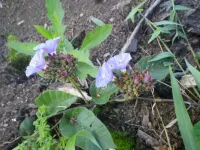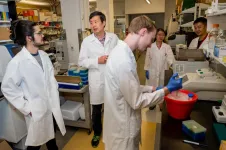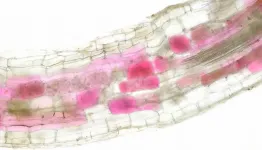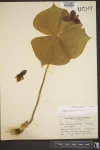Chemotherapy can induce mutations that lead to pediatric leukemia relapse
A collaboration led by St. Jude Children's Research Hospital, Shanghai Children's Medical Center and others revealed how thiopurines produce mutations that lead to multi-drug resistant leukemia and relapse
2021-07-23
(Press-News.org) Chemotherapy has helped make acute lymphoblastic leukemia (ALL) one of the most survivable childhood cancers. Now, researchers working in the U.S., Germany and China have shown how chemotherapy drugs called thiopurines can lead to mutations that set patients up for relapse. The work appears today in the journal Nature Cancer.
The research provides the first direct genomic and experimental evidence in pediatric cancer that drug-resistant mutations can be induced by chemotherapy and are not always present at diagnosis.
"The findings offer a paradigm shift in understanding how drug resistance develops," said Jinghui Zhang, Ph.D., Department of Computational Biology chair at St. Jude Children's Research Hospital. "The results also suggest possible treatment strategies for ALL patients who relapse, including screening to identify those who should avoid additional thiopurine treatment."
Zhang is co-corresponding author of the study with Bin-Bing Zhou, Ph.D., of Shanghai Children's Medical Center; and Renate Kirschner-Schwabe, M.D., of Charite-Universitaetsmedizin Berlin.
The roots of relapse
While 94% of St. Jude patients with ALL become five-year survivors, relapse remains the leading cause of death worldwide for children and adolescents with ALL.
This study involved ALL samples collected from relapsed pediatric ALL patients in the U.S., China and Germany. Researchers analyzed more than 1,000 samples collected from the patients at different times in treatment, including samples from 181 patients collected at diagnosis, remission and relapse.
Co-first author Samuel Brady, Ph.D., of St. Jude Computational Biology, identified a mutational signature that helped decipher the process. Mutational signatures reflect the history of genetic changes in cells.
Brady and his colleagues linked increased thiopurine-induced mutations to genes such as MSH2 that become mutated in leukemia. The mutations inactivated a DNA repair process called mismatch repair and rendered ALL resistant to thiopurines. The combination fueled a 10-fold increase in ALL mutations, including an alteration in the tumor suppressor gene TP53. The mutation, TP53 R248Q, promoted resistance to multiple chemotherapy drugs, including vincristine, daunorubicin and cytarabine.
Working in two cell lines in the laboratory, Zhou and his colleagues replicated the thiopurine-induced TP53 mutations and chemotherapy resistance. The research provided the first direct genomic and experimental evidence of chemotherapy-induced drug resistance mutations. "This study not only changes our ALL treatment considerations, but also opens the door to study mechanistically how defective repair generates drug-resistant mutations," Zhou said.
Chemotherapy's role in relapse
Researchers estimate that treatment-induced mutations play a role in 25% of pediatric ALL relapse. Eight percent of patients in this study had evidence of the thiopurine-associated mismatch-repair signature.
"In the future, it may be possible to monitor bone marrow during treatment as a way to detect these mutational signatures early enough to help identify at-risk patients who may be candidates for emerging therapies like CAR-T cells," Zhang said. But the researchers stressed that the benefits of thiopurine treatment outweigh the risks, noting that most patients are unaffected by thiopurine-induced mutations.
INFORMATION:
Authors and funding
The other first authors are Fan Yang, Chao Tang, Huiying Sun and Lijuan Du, all of Shanghai Jiao Tong University School of Medicine. The other authors are Malwine Barz, Arend von Stackelberg and Cornelia Eckert of Charite-Universitaetsmedizin; Yao Chen, Houshun Fang, Xiaomeng Li, Jiaoyang Cai, Lixia Ding, Tianyi Wang, Shuhong Shen, Hongzhuan Chen, Caiwen Duan, Yu Liu, Hui Li and Benshang Li of Shanghai Jiao Tong University School of Medicine; and Xiaotu Ma, Pandurang Kolekar, Omkar Pathak, and Jeffery Klco of St. Jude.
The research was funded in part by the National Natural Science Foundation of China; National Key R&D Program of China; Shanghai Rising-Star Program; German Childhood Cancer Foundation and ALSAC, the St. Jude fundraising and awareness organization.
[Attachments] See images for this press release:

ELSE PRESS RELEASES FROM THIS DATE:
2021-07-23
Rivers are lifelines for many countries. They create valuable ecosystems, provide drinking water for people and raw water for agriculture and industry. In the Global South in particular, there is strong competition for access to freshwater resources. The increasing use of hydropower has recently intensified this competition further.
Take Ethiopia, for example: when the country began filling the mega-?dam Gibe III on the Omo River in 2015, downstream users saw a drop in water volumes. Natural flooding declined, reducing the volume of fertile mud washed onto the floodplain. The level of Kenya's Lake Turkana, into which the Omo flows, fell temporarily by two metres, resulting in significant consequences for people and agriculture.
Addressing ...
2021-07-23
Scientists have identified five new plant species in the Bolivian Andes.
The species are all part of the genus Jacquemontia, which are twining or trailing plants with pretty blue flowers.
With rapid biodiversity loss taking place across South America and worldwide, identifying plant species is a vital step towards protecting them.
The new study, which classifies and describes the 28 Jacquemontia species now known to live in Bolivia and Peru, was carried out by the universities of Exeter and Oxford, and the Royal Botanic Gardens, Kew.
"Many plant species have not been identified and classified, especially in the tropics," said Rosie Clegg, of the University of Exeter and Kew.
"If you don't know what a species is, you can't ...
2021-07-23
Most children with a mental health disorder are not receiving services to address their needs--according to a new study from researchers at Simon Fraser University's Children's Health Policy Centre. Their research was published this week in the journal Evidence-Based Mental Health.
Researchers found that of the one in eight children (12.7 per cent) who experience a mental disorder, less than half (44.2 per cent) receive any services for these conditions.
"We have illuminated an invisible crisis in children's mental health and unacceptable service shortfalls in high-income countries -- including in Canada -- to a degree that violates children's rights," says study author Charlotte Waddell, ...
2021-07-23
After gaining world attention by 'unboiling' egg protein, Flinders University scientists have now used an Australian-made novel thin film microfluidic device to manipulate Beta-lactoglobulin (β-lactoglobulin), the major whey protein in cow's, sheep's and other mammals.
The so-called Vortex Fluidic Device has previously been used in an array of experiments to successfully 'un-boil' egg protein and even break the molecular bonds of one of the world's hardest material, carbon nanotubes.
In the latest application, published in Molecules, College of Science and Engineering experts have combined the capabilities of the VFD with a new form of biosensor called TPE-MI, which is an aggregation-induced emission luminogen (AIEgen).
"In the human body, protein folding is ...
2021-07-23
The human body is essentially made up of trillions of living cells. It ages as its cells age, which happens when those cells eventually stop replicating and dividing. Scientists have long known that genes influence how cells age and how long humans live, but how that works exactly remains unclear. Findings from a new study led by researchers at Washington State University have solved a small piece of that puzzle, bringing scientists one step closer to solving the mystery of aging.
A research team headed by Jiyue Zhu, a professor in the College of Pharmacy and Pharmaceutical Sciences, recently identified a DNA region known as VNTR2-1 that appears to drive the activity of the telomerase gene, which has been shown to prevent ...
2021-07-23
Almost all crop plants form associations with a particular type of fungi - called arbuscular mycorrhiza fungi - in the soil, which greatly expand their root surface area. This mutually beneficial interaction boosts the plant's ability to take up nutrients that are vital for growth.
The more nutrients plants obtain naturally, the less artificial fertilisers are needed. Understanding this natural process, as the first step towards potentially enhancing it, is an ongoing research challenge. Progress is likely to pay huge dividends for agricultural productivity.
In a study published in the journal PLOS Biology, researchers used the bright red pigments of beetroot - called betalains - to visually track soil fungi as they colonised plant roots in a living plant.
"We can now ...
2021-07-23
Many disease-causing bacteria such as Pseudomonas aeruginosa crawl on surfaces through a walk-like motility known as "twitching". Nanometers-wide filaments called type IV pili are known to power twitching, but scientists ignore which sensory signals coordinate the microbes' movements.
Now, EPFL researchers have found that Pseudomonas bacteria use a mechanism similar to our sense of touch to navigate on surfaces. "This study changes the way we think about motility in bacteria," says senior author Alexandre Persat, a tenure track assistant professor at EPFL's School of Life Sciences.
Scientists have known that ...
2021-07-23
Oncotarget published "Role for Fgr and Numb in retinoic acid-induced differentiation and G0 arrest of non-APL AML cells" which reported that retinoic acid is a fundamental regulator of cell cycle and cell differentiation.
Using a leukemic patient-derived in vitro model of a non-APL AML, these authors previously found that RA evokes activation of a macromolecular signaling complex, a signalosome, built of numerous MAPK-pathway-related signaling molecules; and this signaling enabled Retinoic-Acid-Response-Elements to regulate gene expression that results in cell differentiation/cell cycle arrest. Toward mechanistic ...
2021-07-23
Researchers from George Mason University, University of Manitoba, Colorado State University, and Georgetown University published a new paper in the Journal of Marketing that examines an unintended customer consequence of lobbying, decreased customer satisfaction, and also explains marketing-focused efforts that can help prevent it.
The study, forthcoming in the the Journal of Marketing, is titled "Shedding Light on the Dark Side of Firm Lobbying: A Customer Perspective" and is authored by Gautham Vadakkepatt, Sandeep Arora, Kelly Martin, and Neeru Paharia.
Lobbying, ...
2021-07-23
A network of over 100 herbaria spread out across the southeastern United States recently completed the herculean task of fully digitizing more than three million specimens collected by botanists and naturalists over a span of 200 years. The project, which was funded by the National Science Foundation, is part of a larger, ongoing effort by natural history institutions worldwide to make their biological collections easily accessible to researchers studying broad patterns of evolution, extinction, range shifts, and climate change.
In a END ...
LAST 30 PRESS RELEASES:
[Press-News.org] Chemotherapy can induce mutations that lead to pediatric leukemia relapse
A collaboration led by St. Jude Children's Research Hospital, Shanghai Children's Medical Center and others revealed how thiopurines produce mutations that lead to multi-drug resistant leukemia and relapse







